A guidance counselor and a 17-year-old student find their lives intertwined to explosive effect in Melissa Jane Osborne’s Smile, an IAMA Theatre Company World Premiere as compelling as it is exasperating.
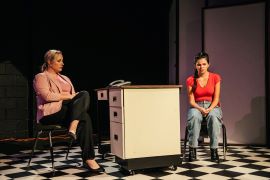 It’s The Year of The Woman, 1992, and a hallway incident at a Philadelphia Main Line high school has sent one of its students to the hospital, leaving it up to Helen (Andria Kozica) to find out what prompted Rachel (Isabella Feliciana) to push Eric so hard, the blow when his head hit the floor may be life-threatening.
It’s The Year of The Woman, 1992, and a hallway incident at a Philadelphia Main Line high school has sent one of its students to the hospital, leaving it up to Helen (Andria Kozica) to find out what prompted Rachel (Isabella Feliciana) to push Eric so hard, the blow when his head hit the floor may be life-threatening.
As for what prompted the aforementioned push, it turns out that it all came down to a single word, “Smile.”
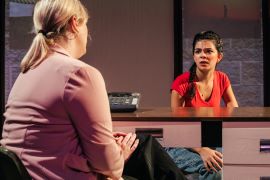 That’s what the high school lacrosse star told Rachel to do, and considering that he’d never once spoken to her before that moment (and that his “Smile” sounded more like an order than a request), she shoved the boy away, though not before grabbing a small Swiss army knife from her pocket, only to scare him she insists, but according to the principal, blood was found on the knife.
That’s what the high school lacrosse star told Rachel to do, and considering that he’d never once spoken to her before that moment (and that his “Smile” sounded more like an order than a request), she shoved the boy away, though not before grabbing a small Swiss army knife from her pocket, only to scare him she insists, but according to the principal, blood was found on the knife.
A few facts come to life during Helen and Rachel’s conversation, most significantly that unlike Eric and his friend Adam, also involved in the scuffle, the young Latina is no child of privilege but the daughter of a Puerto Rican immigrant who rented a room above a garage so that her teenager could attend a better school than the one in their northeast Philly neighborhood.
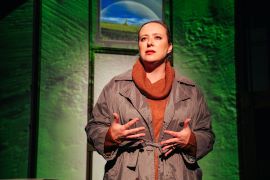 Helen, meanwhile, has issues of her own, mainly grief, the reason for which playwright Osborne parses out ever so gradually, as she does details about Rachel’s fateful hallway encounter.
Helen, meanwhile, has issues of her own, mainly grief, the reason for which playwright Osborne parses out ever so gradually, as she does details about Rachel’s fateful hallway encounter.
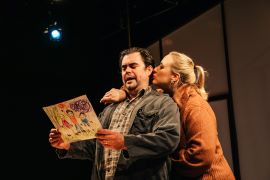 There’s also the matter of Helen and her husband Matt’s (John Lavelle) four-year-old son Brian’s autism (though his condition is never precisely specified), and Helen’s sudden decision to quit her job following today’s counseling session, no matter the financial strain it will cause the already strapped couple.
There’s also the matter of Helen and her husband Matt’s (John Lavelle) four-year-old son Brian’s autism (though his condition is never precisely specified), and Helen’s sudden decision to quit her job following today’s counseling session, no matter the financial strain it will cause the already strapped couple.
If it’s not already clear that Helen and Rachel have “stuff” to deal with, events that follow add fuel to the fire, though to reveal more that I already have would be giving too much away.
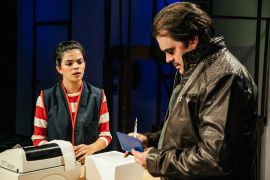 Not that playwright Osborne is any more forthcoming than I am, and while not knowing the whys and wherefores of these two women’s actions does keep an audience on their toes, I’m not sure it’s to Smile’s benefit that its characters withhold so much for so long (and leave us with too many unanswered questions when the lights have faded to black).
Not that playwright Osborne is any more forthcoming than I am, and while not knowing the whys and wherefores of these two women’s actions does keep an audience on their toes, I’m not sure it’s to Smile’s benefit that its characters withhold so much for so long (and leave us with too many unanswered questions when the lights have faded to black).
Also, though I believe we are meant to feel for Helen and all she is going through, I found myself increasingly exasperated by how profoundly messed up her decision-making skills turn out to be, and Rachel’s aren’t much better.
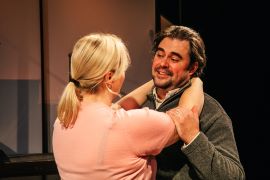 That’s not to say that Smile isn’t riveting. It is. And director Michelle Bossy elicits terrific lead performances from the production’s three stars, though the choppy nature of Osborne’s play (one that requires well over a dozen scene changes) doesn’t help in keeping things moving as smoothly as they should.
That’s not to say that Smile isn’t riveting. It is. And director Michelle Bossy elicits terrific lead performances from the production’s three stars, though the choppy nature of Osborne’s play (one that requires well over a dozen scene changes) doesn’t help in keeping things moving as smoothly as they should.
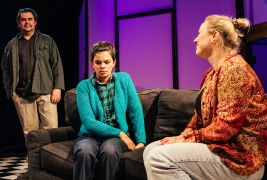 Kozica creates a powerful, very real portrait of a woman who finds her life slowing going off the rails, a three-dimensional Lavelle had me sympathizing with Matt’s frustrations more than his wife’s, and stunning newcomer Feliciana digs deep into Rachel’s feelings of not fitting in either at school or at home.
Kozica creates a powerful, very real portrait of a woman who finds her life slowing going off the rails, a three-dimensional Lavelle had me sympathizing with Matt’s frustrations more than his wife’s, and stunning newcomer Feliciana digs deep into Rachel’s feelings of not fitting in either at school or at home.
Understudy Alex Fox completed Saturday’s opening night cast in a engagingly acted supporting turn as a teenager from Rachel’s Northeast Philadelphia neighborhood, subbing in for Ronit Kathuria.
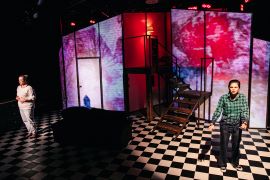 Scenic designer Yuri Okahana-Benson’s set (the framework of a two-story house) and Sean Cawelti’s scene-setting projections combine to facilitate Smile’s multiple changes of locale, as Cawelti projects news clips and images recalling 1992’s Year Of The Woman.
Scenic designer Yuri Okahana-Benson’s set (the framework of a two-story house) and Sean Cawelti’s scene-setting projections combine to facilitate Smile’s multiple changes of locale, as Cawelti projects news clips and images recalling 1992’s Year Of The Woman.
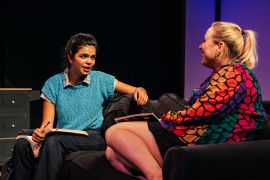 Dan Weingarten’s lighting is his usual topnotch work, Vicki Conrad’s costumes have been carefully designed to match both early 1990s fashions and each character’s personal choices, Heath Harper’s properties add essential details to each new change of scene, and Erin Bednarz’s sound design augments the dramatic impact throughout the production.
Dan Weingarten’s lighting is his usual topnotch work, Vicki Conrad’s costumes have been carefully designed to match both early 1990s fashions and each character’s personal choices, Heath Harper’s properties add essential details to each new change of scene, and Erin Bednarz’s sound design augments the dramatic impact throughout the production.
Tiffany Colli-Moon is season producer and Kat Kim is co-producer. Anna LaMadrid is associate director and dramaturg. Kimberly Sanchez Garrido is production stage manager, Ashley Montoya is assistant stage manager and Rebekah Side is second assistant stage manager.
Destiny Manewal is associate set designer and Avery Orvis is associate sound designer. Chad Smith is technical director and set builder. Angelene Storey is scenic painter. Grant Gerrard is production manager and associate technical director. Lucy Pollak is publicist.
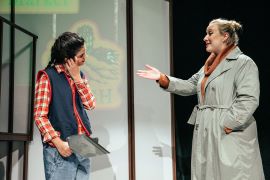 Casting is by Jordan Bass. Josh Bywater, Sal Neslusan, and Skarlett Redd are understudies.
Casting is by Jordan Bass. Josh Bywater, Sal Neslusan, and Skarlett Redd are understudies.
If nothing else, Melissa Jane Osborne gives audiences plenty to think about in Smile, and that’s precisely what I’ve been doing since Opening Night. I just wish I’d cared more about a lead character who ends up her own worst enemy.
IAMA Theatre Company. Atwater Village Theatre, 3269 Casitas Ave., Atwater Village.
www.iamatheatre.com
–Steven Stanley
November 12, 2022
Photos: Jeff Lorch
Tags: Atwater Village Theatre, IAMA Theatre Company, Los Angeles Theater Review, Melissa Jane Osborne


 Since 2007, Steven Stanley's StageSceneLA.com has spotlighted the best in Southern California theater via reviews, interviews, and its annual StageSceneLA Scenies.
Since 2007, Steven Stanley's StageSceneLA.com has spotlighted the best in Southern California theater via reviews, interviews, and its annual StageSceneLA Scenies.







 COPYRIGHT 2024 STEVEN STANLEY :: DESIGN BY
COPYRIGHT 2024 STEVEN STANLEY :: DESIGN BY